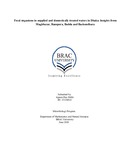Fecal organisms in supplied and domestically treated waters in Dhaka: insights from Maghbazar, Rampura, Badda and Bashundhara

View/
Date
2019-06Publisher
Brac UniversityAuthor
Jhilik, Apsara DeyMetadata
Show full item recordAbstract
Dhaka is one of the most congested cities of the world, With a population of over 18 million . The existing water supply system is not enough to fulfill the demand of clean drinking water for people in Dhaka city.This study aims at detecting coliform(FC) and Salmonella spp in supplied and domestically treated (Boiled or Filtered) waters in Maghbazar ,Rampura, Badda and Bashundhara zones. A total of 157 samples were collected from above mentioned four residential areas starting from October 2018 to April 2019.The water samples were tested . The supplied water samples collected from these four zones produced variable FC counts (cfu/100mL); zero, 1-5, 6-30, 31- 100, and >100 were detected in 34%, 8.12%, 14.56%, 42%, and 4.78% samples respectively . While 67% of the boiled water samples yielded no FC, others showed variable degrees of FC counts (cfu/100mL); 1-5 in 10.37%, 6-30 in 13.79% and >100 count was detected in 8.32% samples. In case of the filtered waters 57% samples had zero FC counts. However, FC counts (cfu/100mL) of 1-5, 6- 30, 31-100, and >100 were detected in 1.80%, 8.37%, 6.50% and 2.50% samples respectively.The presence of Salmonella spp were detected by performing PCR of the water samples .Water samples collected from Maghbazar , Rampur and Badda (nine to ten samples respectively) were detected with presence of Salmonella spp which reveals the raw water contains (10-14) % Salmonella spp and treated water contains 1% Salmonalla spp.The result of this study suggests that, the water samples from these areas are possibly contaminated with pathogenic bacteria.
